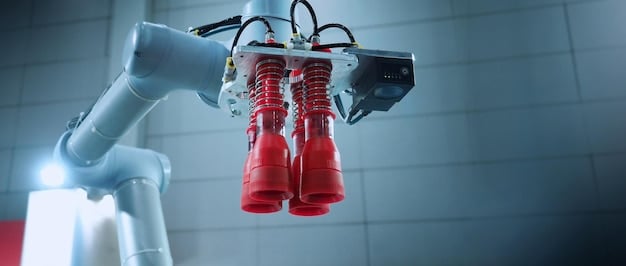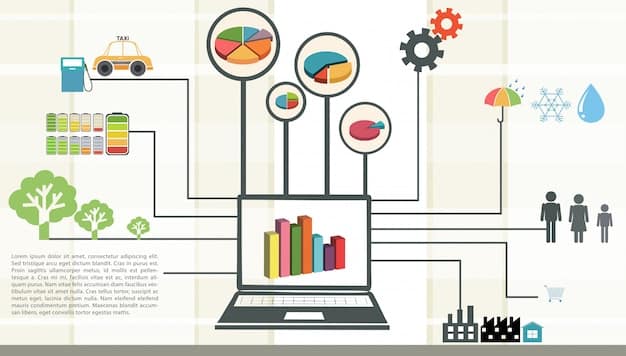The Rise of Automation: Navigating the Job Market in the Next 5 Years

The Rise of Automation: How Will It Affect the Job Market in the Next 5 Years? Automation is rapidly transforming industries, leading to both job displacement and the creation of new opportunities requiring different skill sets. Understanding these shifts is crucial for workers and businesses alike to adapt and thrive.
The job market is constantly evolving, but the pace of change is accelerating due to the rise of automation: how will it affect the job market in the next 5 years? As machines and algorithms become more sophisticated, they are increasingly capable of performing tasks that were once the domain of human workers.
This shift presents both challenges and opportunities. Some jobs will undoubtedly be lost to automation, while others will be created. The key to navigating this changing landscape is understanding which skills will be in demand and preparing to adapt to new roles.
Understanding the Current State of Automation
Automation is no longer a futuristic concept; it’s a present-day reality. From manufacturing and logistics to customer service and finance, various industries are already experiencing significant automation.
The Breadth of Automation Across Industries
Automation isn’t confined to a single sector. It’s permeating various industries, reshaping how work is done and impacting employment patterns.
- Manufacturing: Robots and automated systems are increasing efficiency and reducing costs on production lines.
- Logistics: Automated warehouses and delivery drones are streamlining supply chains and accelerating delivery times.
- Customer Service: Chatbots and AI-powered systems are handling customer inquiries and providing support.
- Finance: Algorithms are automating trading, risk management, and fraud detection processes.
This widespread adoption of automation technologies underscores its transformative potential. The Rise of Automation: How Will It Affect the Job Market in the Next 5 Years? is not just a possibility; it’s a reality that businesses and workers must address.

The Economic Drivers Behind Automation
Businesses are investing in automation for a variety of reasons, including increased efficiency, reduced costs, and improved quality.
The economic incentives for automation are compelling. Companies can achieve higher output with fewer errors, leading to increased profitability. Furthermore, automated systems can operate 24/7 without breaks or vacations, maximizing productivity. Ultimately, these factors contribute to a significant return on investment, driving further adoption of automation technologies.
The increasing availability and affordability of automation technologies are also contributing to their widespread adoption. As the cost of robots, AI software, and other automation tools decreases, more businesses can afford to invest in these technologies, further accelerating the pace of automation. This accessibility is a key factor in understanding the rise of automation: how will it affect the job market in the next 5 years?
In conclusion, the current state of automation is characterized by its widespread adoption across industries and the compelling economic drivers that encourage its further expansion.
Jobs at Risk Due to Automation
While automation offers numerous benefits, it also poses a threat to certain jobs. Understanding which roles are most vulnerable is crucial for workers seeking to future-proof their careers.
Identifying Vulnerable Job Categories
Certain job categories are more susceptible to automation than others. These typically involve repetitive, routine tasks that can be easily replicated by machines or algorithms.
- Data Entry Clerks: Automated software can accurately and efficiently input and process data.
- Assembly Line Workers: Robots can perform repetitive tasks on production lines with greater speed and precision.
- Truck Drivers: Self-driving vehicles have the potential to automate transportation and logistics.
- Customer Service Representatives: Chatbots and AI-powered systems can handle many customer inquiries.
These are just a few examples of the many job categories that are at risk due to automation. As technology continues to advance, even more roles may become vulnerable. It is crucial to acknowledge that the Rise of Automation: How Will It Affect the Job Market in the Next 5 Years? will inevitably lead to displacement in certain sectors.
The Impact on Different Skill Levels
Automation is likely to disproportionately impact workers with lower skill levels. These roles often involve tasks that are easily automated.
Workers with higher skill levels, particularly those involving creativity, critical thinking, and complex problem-solving, are generally less vulnerable to automation. These skills are difficult to replicate with machines and are often in high demand in the modern economy. It’s important to note that even high-skilled jobs aren’t entirely immune. Components of these roles may gradually be automated, requiring constant adaptation and upskilling.
To mitigate the negative effects of automation, workers need to invest in education and training to acquire in-demand skills. This may involve learning new technical skills, such as coding or data analysis, or developing soft skills, such as communication and collaboration. Acquiring new skills will be essential to adapt to the rise of automation: how will it affect the job market in the next 5 years?

Strategies for Workers in At-Risk Jobs
Workers in at-risk jobs can take steps to adapt to the changing landscape and increase their job security.
Upskilling and reskilling are essential strategies for workers in at-risk jobs. This involves acquiring new skills and knowledge that are in demand in the modern economy. Workers may consider taking online courses, attending workshops, or pursuing further education to enhance their skills.
In summary, automation poses a threat to certain jobs, particularly those involving repetitive, routine tasks and those requiring lower skill levels. However, workers can take steps to adapt to the changing landscape by upskilling, reskilling, and focusing on uniquely human skills.
Emerging Job Opportunities in the Age of Automation
While automation may displace some jobs, it’s also creating new opportunities. Understanding these emerging roles is key to navigating the changing job market.
The Rise of Automation: How Will It Affect the Job Market in the Next 5 Years?
Automation isn’t just about replacing jobs; it’s also about creating them.
- AI and Machine Learning Specialists: Developing and maintaining AI-powered systems.
- Data Scientists: Analyzing and interpreting data to improve business decisions.
- Robotics Engineers: Designing, building, and maintaining robots and automated systems.
- Automation Consultants: Helping businesses implement and optimize automation strategies.
These are just a few examples of the many emerging job opportunities in the age of automation. As technology continues to advance, even more new roles will be created. Navigating the rise of automation: how will it affect the job market in the next 5 years? requires an understanding of where new opportunities will arise.
Focus on Skills That Complement Automation
The most in-demand skills in the age of automation are those that complement and enhance the capabilities of machines.
Critical thinking involves analyzing information, evaluating arguments, and forming judgments. Creativity involves generating new ideas and solutions. Communication involves effectively conveying information and ideas. Collaboration involves working effectively with others to achieve common goals. These skills are difficult for machines to replicate and are highly valued in the modern economy.
To succeed in the age of automation, workers need to cultivate these uniquely human skills and focus on how they can contribute to the workplace alongside machines. The Rise of Automation: How Will It Affect the Job Market in the Next 5 Years? will require humans and machines to enhance each other, rather than compete. This means finding ways to leverage automation to improve productivity and efficiency while focusing on the skills that humans do best.
The Importance of Continuous Learning
The job market is constantly evolving, so continuous learning is essential for staying relevant and competitive.
Workers need to be proactive in acquiring new skills and knowledge throughout their careers. This may involve taking online courses, attending workshops, or pursuing further education. Continuous learning is crucial for adapting to the changing demands of the job market and for seizing new opportunities as they arise. Staying ahead of the rise of automation: how will it affect the job market in the next 5 years requires remaining informed and adaptable.
In conclusion, automation is creating new job opportunities, particularly in areas that complement and enhance the capabilities of machines. To thrive in the age of automation, workers need to focus on developing uniquely human skills and engaging in continuous learning.
How Businesses Can Adapt to the Changing Job Market Because of Automation
Businesses also need to adapt to automation by investing in training programs and creating a culture of innovation.
The Role of Training and Development
Businesses need to invest in training and development programs to help their employees acquire the skills they need to succeed in the age of automation.
These programs may involve teaching employees new technical skills, such as coding or data analysis, or developing their soft skills, such as communication and collaboration. By providing employees with the necessary training, businesses can ensure that they have the skills to adapt to the changing demands of the job market and to effectively work alongside machines. Embracing the rise of automation: how will it affect the job market in the next 5 years? means embracing a commitment to continuous learning and workforce development.
Fostering a Culture of Innovation
Businesses need to foster a culture of innovation to encourage employees to explore new ideas and solutions.
This may involve creating opportunities for employees to experiment with new technologies or to collaborate on innovative projects. By fostering a culture of innovation, businesses can generate new ideas and solutions that can help them to stay ahead of the competition and to adapt to the changing demands of the job market. Creating a strong company structure that has the ability to adopt the rise of automation: how will it affect the job market in the next 5 years? will also require a shift in mindset.
For example, many businesses understand that a well-organized business is one where the business has a solid business plan. However, a well-organized business in the age of automation requires businesses to have a solid plan to stay updated on new technologies, what new technology can do for your business and workforce, and upskilling employees to take full advantage of it.
Embracing Flexibility and Adaptability
Businesses need to be flexible and adaptable to respond to the changing demands of the job market.
This may involve changing their business models, adopting new technologies, or restructuring their organizations. By being flexible and adaptable, businesses can respond quickly to the changing demands of the job market and to remain competitive. The Rise of Automation: How Will It Affect the Job Market in the Next 5 Years? also means understanding the global landscape to compare and contrast.
In summary, businesses need to adapt to the changing job market by investing in training programs, fostering a culture of innovation, and embracing flexibility and adaptability.
Government Policies to Support Workers During the Automation Revolution
Government policies can play a crucial role in supporting workers during the automation revolution. These policies can help to mitigate the negative effects of automation, such as job displacement, and to ensure that workers have the skills and resources they need to succeed in the changing job market.
Investing in Education and Training
Governments can invest in education and training programs to help workers acquire the skills they need to succeed in the age of automation.
These programs may involve providing funding for community colleges, vocational schools, and apprenticeship programs. Governments can also provide incentives for businesses to invest in training and development programs for their employees. There will need to be investments that will cover the effects of the Rise of Automation: How Will It Affect the Job Market in the Next 5 Years?
Strengthening the Social Safety Net
Governments can strengthen the social safety net to provide support for workers who lose their jobs due to automation.
This may involve expanding unemployment insurance benefits, providing job search assistance, and offering retraining programs. By strengthening the social safety net, governments can help to cushion the blow for workers who are displaced by automation and to provide them with the resources they need to find new employment.
Promoting Lifelong Learning
Governments can promote lifelong learning to encourage workers to continuously acquire new skills and knowledge throughout their careers.
This may involve providing tax breaks for education expenses, offering scholarships and grants for adult learners, and creating online learning platforms. By promoting lifelong learning, governments can help to ensure that workers have the skills they need to adapt to the changing demands of the job market and to seize new opportunities that will deal with the rise of automation: how will it affect the job market in the next 5 years?.
In conclusion, the government can play a vital role in helping the workforce during this automation era. When the government provides ways for the workforce to learn new skills, it would give the population a fair chance to still have their place in the workforce.
| Key Point | Brief Description |
|---|---|
| 🤖 Automation Impact | Job displacement in routine tasks, new roles in AI/data. |
| 🚀 Emerging Jobs | Demand for AI specialists, data scientists, and robotics engineers. |
| 📚 Essential Skills | Focus on critical thinking, creativity, and continuous learning. |
| 💼 Business Adaptation | Invest in training, foster innovation, and embrace flexibility. |
Frequently Asked Questions About Automation
Automation will lead to job displacement in some areas, particularly in routine and repetitive tasks. However, it will also create new jobs in areas such as AI, data science, and robotics.
The most in-demand skills will be those that complement automation, such as critical thinking, creativity, communication, and collaboration. These skills are difficult for machines to replicate.
Workers can prepare by upskilling and reskilling, focusing on uniquely human skills, and engaging in continuous learning throughout their careers. They need to stay informed on the most up-to-date technologies.
Businesses should invest in training and development programs, foster a culture of innovation, and embrace flexibility and adaptability. They should also continuously reassess their market position.
Governments can invest in education and training, strengthen the social safety net, and promote lifelong learning. These investments will allow for governments to stay up-to-date on the issues related to the rise of automation.
Conclusion
The rise of automation: how will it affect the job market in the next 5 years? Automation is undeniably reshaping the job market, presenting both challenges and opportunities. By understanding the trends, acquiring new skills, and adapting to the changing landscape, workers and businesses can thrive in the age of automation.





